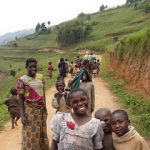Being Fearful and Boldly Gay in Sri Lanka
Sri Lanka is thankfully no longer a war torn culture. During and after the conflict the country has offered modest convenience to lesbigay citizens thanks to the activism of a courageous few. To be sure many LGBT citizens live in closeted misery but more recently voices of equality and respect have become louder. Being traditionally Buddhist there is little fear of overt homophobic violence yet archaic colonialist anti-gay laws still apply.
Also see:
Gay Sri Lanka News & Reports 1995 to present
Gay Sri Lanka Photo Gallery
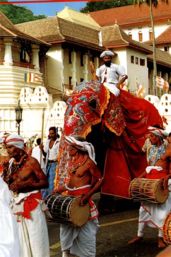
By Richard Ammon
Updated June 2021
A Torn Land
Sri Lanka is a bittersweet dream set in the azure waters of the Indian Ocean. Blessed with fertile land, mild climate and endearing people, it was cursed with an intransigent guerilla war that finally ended in 2009.
My first thought about going to this island nation in 2007 was hesitation, but I’ve been to enough troubled lands to know that impressions generated by the media or popular opinions are usually inadequate and distorted. So I made contact with native Sinhalese (Sri Lankan) residents and was firmly reminded that, no, the whole country was not up in civil war flames and, yes, the Tamil terrorists (who fought for a separate homeland) were active but only in the north–except for the occasional bombing in Colombo, as happened in 1996 and 2000. Thankfully the bullets have stopped but the suffering of the displaced has not, yet.
Driving Around with Ease
The central and western parts of the country range from idyllic palm-lined beaches and ancient fortified seacoast cities to verdant mountain tea plantations and stunning Buddhist temples built a thousand years ago. In each setting, we encountered friendly curious people with strikingly handsome features and gentle attitudes who beamed with eager smiles when asked to pose for a photo.
We hired a car and driver for a week. At no time did we feel in danger from terrorists; access to any venue was easy–from a simple Internet shop to the famous Temple of the (Buddha’s) Tooth in picturesque Kandy City beside a mountain lake. Accessing comfortable hotels was only a small effort, including the stately mansion called the Hill Club, a former British private estate complete with billiard room, coat-and-tie (borrowed) dining and a hot water bottle in bed (it’s chilly in the mountains).
The only distressing incident was seeing a sect of Hindus parading down a rural village street with three of their temple members pierced like fakirs with large metal hooks into their skin being pulled on ropes by other members. One of the ‘penitents’ was grotesquely dangled from a hoist with rope hooks into the skin of his back.
Our driver thought little of this display as he stopped to let me take some photos: “They do this all the time. It’s a way to get money”, he said. Sure enough, no sooner had I pointed my lens than three of their members rushed up to collect my unavoidable donation.
Different Gay Lifestyles
Compared to these wretches on hooks, I thought gays must have it easy here. In actuality, the ease or distress of lesbigay people in Sri Lanka is very much a function of their class. Although there is little overt class distinction in this country compared to India’s sharp castes, in Sri Lanka money, education and family status do matter. These create distinct qualities of life for queer folks as well in this island nation of eighteen million people.
(1) Jorge and Hans: Privileged Gays
Jorge and Hans live in Sri Lanka yet they are mostly exempt from much of Sri Lanka’s encumbering traditions. They live a life qualitatively different than most other gays in Sri Lanka because their European birth and attitudes shield them. Most denizens here are constricted by the Sinhalese standards that bind young men and women into expectations of marriage and duty to parents.
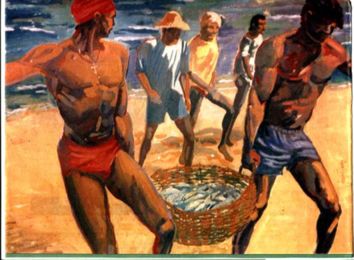 Over lunch (eaten with fingers, no silverware) with Jorge and Hans at their home in the West Coast town of Negombo, we learned–and saw–the distinct advantages of economic and political power. Jorge is half Sri Lankan, half English. With his partner of 28 years Hans a German dance teacher, they live in their own house and spend part of the year in England.
Over lunch (eaten with fingers, no silverware) with Jorge and Hans at their home in the West Coast town of Negombo, we learned–and saw–the distinct advantages of economic and political power. Jorge is half Sri Lankan, half English. With his partner of 28 years Hans a German dance teacher, they live in their own house and spend part of the year in England.
In Negombo they employ a family of helpers and servants (hired help rarely come without attached families). Jorge is a successful artist who portrays sensuously bold images of local natives (photo right) in their common routines. Some images portray fishermen with boats and nets while some are paintings of women with food. His work has been acclaimed locally and abroad. A recent show in a Colombo gallery had buyers for almost all his works.
Money, of course, has always provided more privilege, privacy and protection from the social constrictions of any culture. Jorge related the story of a wealthy Sinhalese corporate executive who lives alone and informally adopted two ‘sons’ over time. As rewards to these amorous proteges, he paid for their education and secured respectable professions for them. Although his peers and friends knew of the arrangements, they simply chose to ignore standard attitudes and included him and his ‘children’ in their social lives.
In addition to affluence (here, ‘middle class’ is affluent) the key is obviously discretion. With a mischievous smile Jorge told us that homosexuality pervades every level of Sri Lankan life. A relative of the President of Sri Lanka is affectionately known to be a ‘fag hag’ who throws wonderfully gossip-filled parties. Other guests of hers include the occasional minister or high level official with a sweet-faced ‘apprentice’ in tow. “At that level, they don’t care what anyone thinks. Of course they’re discrete but everyone knows anyway.”
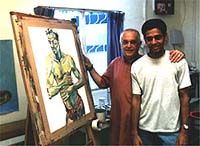 When we first arrived Jorge was in his studio, a bright skylighted room cluttered with easels, various canvases in progress, colorful smeared palettes, art books, a mix of chairs and shelves–a stirring, disheveled sanctuary of creativity. He was just finishing a sitting with one of his local models, a handsome swarthy young man with a thick shock of black hair, broad dark eyebrows, deep bituminous eyes and full lips.
When we first arrived Jorge was in his studio, a bright skylighted room cluttered with easels, various canvases in progress, colorful smeared palettes, art books, a mix of chairs and shelves–a stirring, disheveled sanctuary of creativity. He was just finishing a sitting with one of his local models, a handsome swarthy young man with a thick shock of black hair, broad dark eyebrows, deep bituminous eyes and full lips.
A half-length portrait of the man, dressed in a traditional waist-length sarong of bright colors, was emerging on the canvas. This was the second of three sittings needed to finish the painting. “They’re always so shy at first, sitting almost naked for me. They are very modest, you know”, said Jorge as he escorted the young man to the door. “And they’re all straight…such a pity”, Hans lamented with a benign smile as they waved good bye to the lucky young man with the golden smile.
(2) Jay: No Privileges
Hidden away in a little working-class village a few miles east of Colombo, Jayambo sounds forlorn and resigned to his isolation. He feels he is the only gay man in his dusty hometown of three thousand. His life is proscribed by the law, which outlaws homosexuality in Sri Lanka, and proscribed by his family’s expectation to obediently follow tradition–take a wife and produce children. Both weigh heavily on him, as he feels pressed into a resigned frustration. When I asked him what he would do, say, in three years he squirmed and could only say, “I don’t know, I have no answer now.”
His shadow-box life is compounded by a frightened lack of gay friends. He has no contact with gay organizations. (He shuns the main gay organization in Colombo because he claims they are too “nellie”.) His only sexual outlet is a rare quickie “in a dark place for five minutes” with no further communication. Occasionally he feels driven to cruise along the Wellawatta beach south of the famous Galle Face Hotel in Colombo even though it is risky because of police patrols that are on guard against outlaw Tamil rebels.
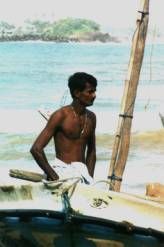 If he were caught in the act he could face a court appearance with great humiliation for himself and his family, as well as a fine–or bribe–to the arresting officers. For Jay even the Internet has proven disappointing, as he has made some contacts which resulted in no-shows at the appointed place and time.
If he were caught in the act he could face a court appearance with great humiliation for himself and his family, as well as a fine–or bribe–to the arresting officers. For Jay even the Internet has proven disappointing, as he has made some contacts which resulted in no-shows at the appointed place and time.
Jay’s conundrum is typical of virtually every gay and lesbian person in this country formerly known as Ceylon. Much of the religious and social standards derive from India where friendship and romance are often blurred in a subtle, silent, unspoken blend of feelings. Despite the fact that in both India and Sri Lanka men hold hands or walk arm in arm and affectionately touch each other–as women do with women–any overt sign of homosexual behavior is sternly condemned.
Religious proscriptions (Buddhist, Hindu) discourage the genders from intimate contact until marriage, so the years of teenage and young adult friendship sometimes include same-sex erotic pleasure as part of a best-friend camaraderie. Such homo-eros expresses itself without label or analysis; it is simply an expression of care and trust although not without some measure of fear.
These gentle and susurrated affections emerge despite a staunch but not violent homophobia in the culture. As elsewhere in the world, negative irrational reactions are further fueled in no small part by the ignorance and intolerance of Christian Biblical judgments. Many Sri Lankans have turned away from ‘Pepsi’ Buddhism to Christianity because of the charitable works of missionaries among the poor.
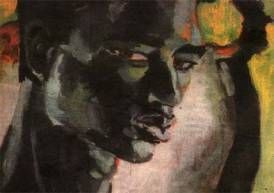 Judgments or not, deep longing for affection and sensuality stir within Jay as he gropes his way through the thicket of his culture and his sexuality. The naive affections of friendship are insufficient to feed his inner hunger. When I suggested that he move to the capitol Colombo to live and make contact with other gay people, he ruefully countered, “this is not China where so many people are. There a person can go to the city and get lost from his home. But here in Sri Lanka, it is a small place and everyone knows your business.”
Judgments or not, deep longing for affection and sensuality stir within Jay as he gropes his way through the thicket of his culture and his sexuality. The naive affections of friendship are insufficient to feed his inner hunger. When I suggested that he move to the capitol Colombo to live and make contact with other gay people, he ruefully countered, “this is not China where so many people are. There a person can go to the city and get lost from his home. But here in Sri Lanka, it is a small place and everyone knows your business.”
So fearful is Jay of being exposed, he would only pronounce the letter ‘G’ when talking to me about gays. “G-people have no choice. They are married and have kids to fit in–but it’s so stupid because then they ‘wander’ when they feel the urge. It’s a terrible situation.” This sense of isolation within one’s own family is a torment. To embarrass a wife’s family by being caught with another man is among the worst dishonors a husband can bring upon them.
To makes matters worse, the silence that surrounds such an embarrassment only serves to further punish the offender. The discovery will not be discussed and the wife must continue to live with her closeted queer husband.They must be seen as a family even though others know it is a sham. (The 1987 Sri Lankan film “Giniya” depicted the nocturnal activities of just such a tormented husband.)
As Jay and I ended our talk, I felt some sadness but also some anger that he was not stronger and resilient enough to avoid becoming a victim to his own homophobia. He seemed at real risk of succumbing to the powerful social forces pressing on him and living the tormented sham he loathed. The possibility of any slight happiness as a gay person seemed far too remote for him at this time.
(3) A Brave New World: EQUAL GROUND with Rosanna Flamer-Caldera
Sri Lanka is one of the world’s smallest countries but it is home to one of the best known gay activists, Rosanna Flamer-Caldera .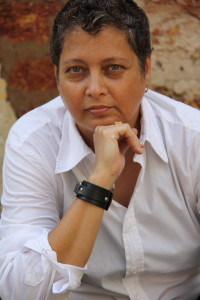
EQUAL GROUND
EQUAL GROUND is the major player in the drive for equal rights in Sri Lanka. It was founded by Rosanna Flamer-Caldera (photo right) in 2004 and has been a driving force since then. It’s a non profit organization seeking human and political rights for the Lesbian, Gay, Bisexual, Transgender, Intersex and Questioning (LGBTIQ) community of Sri Lanka. See their impressive website for details about their involvements in the Sri Lankan society.
EQUAL GROUND is the only organization in Sri Lanka to hold an annual Pride celebration. Pride week was first started in 2005 with a brave 350 souls attending then. Recently the event draws thousands of visitors and participants.”We work very hard to provide for the needs of the community each year giving the LGBTIQ community of Sri Lanka the space to stand up tall and be proud of who and what they are. Pride in Sri Lanka is currently on a small scale and whilst we hope to one day march the streets demanding our rights, the current political climate coupled with the oppressive laws against LGBTIQ persons, impedes a peaceful march. Therefore, Pride celebrations take place as private, yet very public functions attended by persons from all over Sri Lanka.” Activities include a film festival, community enhancement workshops, a theatre production and parties.
“EQUAL GROUND strives to identify, address and transform the intellectual and cultural context that perpetuates a divisive Sri Lankan culture. The necessity for an organization like ours is that while promoting positive aspects of diversity, there is also a need to protect people whose sexual orientation and gender identity do not fall within the hetero-normative box society has created.”
When the tsunami disaster of December 2004 hit Sri Lanka EQUAL GROUND courageously pitched in with aid and helped raise funds toward relieving the vast destruction. See Gay Sri Lanka News & Reports for more detailed information about the disaster and EQUAL GROUND’s involvement.
In 2005, to observe the International Day Against Homophobia, EQUAL GROUND launched its first Human Rights Publication entitled ‘Human, Right?’ The book was aimed at a cross section of Sri Lankan society and offered the reader a basic knowledge of Human Rights, including LGBTIQ rights, within the larger Human Rights framework. Said Ranjan Karunaratne a member of the organization. “It is high time Sri Lankans shed their colonial past and acknowledged the LGBTIQ community as deserving of their inherent human rights.”
EQUAL GROUND offers a free counseling hotline for LGBTIQ persons in distress or are questioning. Phone volunteers speak English, Sinhala and Tamil and there is a women-only line for lesbian and bi women. The hotline is located in the EG office where a staff of fourteen volunteers also maintain the Colombo LGBTIQ ‘Safe Space’. Here too is a library of LGBTIQ books and DVDs for visitors to access. The Safe Space is used for social activities such as dance classes, self defense classes, movie nights, cross dressers evenings, and theme nights.
Additionally EG offers the ‘Adare Pata’ (Colours of Love) health brochure to educate about safer-sex practices, HIV and STI prevention methods and information on where to access testing. Another publication is “Breast and Cervical Cancer – information for women who love women” that is also available at workshops on sexual health and reproductive rights.
Other publications include a quarterly newsletter called ‘Rainbow News’ as well as pamphlets titled ‘Breast and Cervical Cancer’ (information for women who love women); ‘Stepping Out of the Shadows: Same Sex domestic Violence in Sri Lanka’; ‘Stepping Out’ (for parents of children with alternate sexual orientations and gender identities). There is a booklet called ‘The Yogyakarta Principles’ (about human and LGBT rights translated into Sinhala and Tamil); also a booklet titled ‘Struggling Against Homophobic Violence and Hate Crimes’ (a report on the documentation and research conducted by EQUAL GROUND from April 2010-June 2011 on violence against lesbian and bi women in the rural areas ).
Hidden Past, Open Future
Sri Lanka is not about to become another New Zealand or South Africa with constitutional protections for gays any time soon. Like other Asian traditions it is steeped in religious and cultural proscriptions against homosexuality. However, this beautiful gem of a country is also blessed with mild attitudes that are pliable.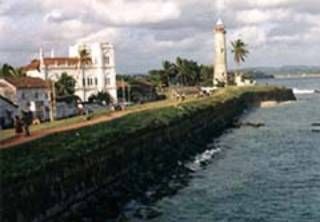
Meanwhile the beauty of the land continues unabated and fearful gay natives live in the shadows. Affluent gay tourists may come to admire (or seduce) the native beauties but often leave with little understanding of the complex truth about these gentle folks. But if Rosanna and EQUAL GROUND have anything to say about it, things will change.
(Also see Gay Sri Lanka News & Reports #19 & #20 for some personal accounts of cruising gay Sri Lankans.)


